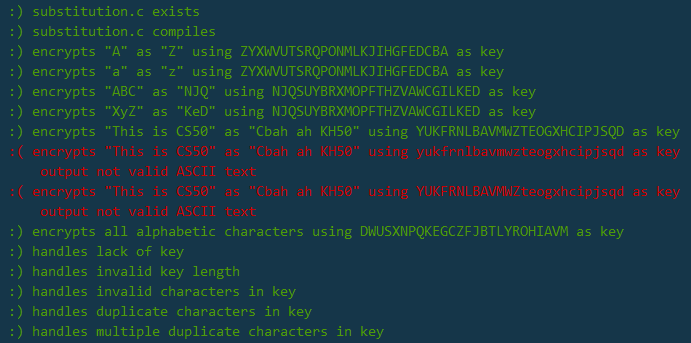Edit2: Latest code (working)
int main (int argc, string argv[])
{
// Checking for proper command line input
if (argc != 2)
{
printf("Usage: ./substituion key\n");
return 1;
}
// Checking for 26 character input key
if (strlen(argv[1]) != 26)
{
printf("Key must contain 26 characters.\n");
return 1;
}
// Checking for alphabetic input
for (int i = 0; i < 26; i++)
{
if (argv[1][i] >= 'a' && argv[1][i] <= 'z')
{
argv[1][i] = argv[1][i];
}
else if (argv[1][i] >= 'A' && argv[1][i] <= 'Z')
{
argv[1][i] = argv[1][i];
}
else
{
printf("Key must only contain alphabetic characters.\n");
return 1;
}
}
// Checking for repeated characters
for (int i = 0; i < 26; i++)
{
for (int j = 25; j > i; j--)
{
if (argv[1][i] == argv[1][j])
{
printf("Key must not contain repeated characters.\n");
return 1;
}
}
}
// Removing key's sensitiity
for (int i = 0; i < 26; i++)
{
if (argv[1][i] >= 'A' && argv[1][i] <= 'Z')
{
argv[1][i] = argv[1][i];
}
else
{
argv[1][i] -= 32;
}
}
// Getting plaintext input
string message = get_string("plaintext: ");
// Substitution of plaintext to key
for (int i = 0, n = strlen(message); i < n; i++)
{
for (int j = 0; j < 26; j++)
{
if (message[i] == j + 'A')
{
message[i] = argv[1][j];
j = 26;
}
else if (message [i] == j +'a')
{
message[i] = argv[1][j] + 32;
j = 26;
}
}
}
// Ciphertext
printf("ciphertext: %s\n", message);
return 0;
}
[OUTDATED/ANSWERED] Edit: Here's my code.
#include <ctype.h>
#include <cs50.h>
#include <stdlib.h>
#include <stdio.h>
#include <string.h>
int main (int command, string line[])
{
// Checking for proper command line input
if (command == 2)
{
// Checking for 26 character input key
if (strlen(line[1]) == 26)
{
// Checking for alphabetic input
for (int i = 0; i < 26; i++)
{
if (line[1][i] >= 'a' && line[1][i] <= 'z')
{
line[1][i] = line[1][i];
}
else if (line[1][i] >= 'A' && line[1][i] <= 'Z')
{
line[1][i] = line[1][i];
}
else
{
printf("Key must only contain alphabetic characters.\n");
return 1;
}
}
// Checking for repeated characters
for (int i = 0; i < 26; i++)
{
for (int j = 25; j > i; j--)
{
if (line[1][i] == line[1][j])
{
printf("Key must not contain repeated characters.\n");
return 1;
}
}
}
// Getting plaintext input
string message = get_string("plaintext: ");
// Substitution of plaintext to key
for (int i = 0, n = strlen(message); i < n; i++)
{
for (int j = 0; j < 26; j++)
{
if (message[i] == j + 'A')
{
message[i] = line[1][j];
j = 26;
}
else if (message [i] == j +'a')
{
message[i] = line[1][j] + 32;
j = 26;
}
}
}
printf("ciphertext: %s\n", message);
return 0;
}
else
{
printf("Key must contain 26 characters.\n");
return 1;
}
}
else
{
printf("Usage: ./substituion key\n");
return 1;
}
}
Hi, I found a similar question asked here but I couldn't quiet get the answer provided. The answer said that the outputs must be the same, but the outputs are the same.
The three similar keys (YUKFRN...) used to test by check50 in substitution.c seems to be for checking the case sensitivity of the code. The ciphertext for these three similar keys must be the same then, and my code did output same ciphertexts for each of them. But why was it wrong somehow? Thanks in advance.
